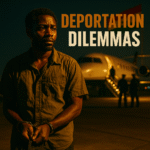

Deportation Dilemmas: African Nations and US Policy
By Darius Spearman (africanelements)
Support African Elements at patreon.com/africanelements and hear recent news in a single playlist. Additionally, you can gain early access to ad-free video content.
Ghana’s Role in Deportation
Ghana has stepped into a complex international issue by accepting West African nationals deported from the United States. President John Dramani Mahama confirmed the arrival of 14 deportees, including Nigerians and one Gambian, who have since been facilitated to return to their home countries (primenewsghana.com). This move highlights Ghana’s position within the Economic Community of West African States (ECOWAS), a regional political and economic union of fifteen West African countries. ECOWAS promotes economic integration across the region, including a policy of visa-free movement for citizens among member states. This policy helps explain why Ghana would accept deportees from neighboring West African nations, as their ultimate destination is often within the ECOWAS bloc.
President Mahama’s announcement came during a media encounter at the Jubilee House (primenewsghana.com). This engagement provided a platform to discuss various national matters, including the nation’s economic performance. Ghana’s economy expanded by 6.3% in the second quarter of the year, primarily driven by the services sector (primenewsghana.com). The acceptance of deportees from the US, while a humanitarian gesture, also places Ghana in a unique position regarding international migration policies and its relationship with the United States.
Trump’s Deportation Policy Under Scrutiny
The Trump administration’s policy of mass deportations has drawn significant criticism for its indiscriminate targeting of immigrants. This includes individuals without criminal records, raising concerns about potential violations of due process (mediamatters.org). Due process in immigration enforcement refers to the legal rights and procedures that must be followed before an individual can be deported. These rights typically include the right to a fair hearing, the right to legal representation, and the right to appeal a decision. Critics argue that the Trump administration’s approach often bypassed these fundamental protections.
Initially, the Trump administration claimed it would prioritize deporting the “worst first,” focusing on immigrants with serious criminal offenses (mediamatters.org). However, reports quickly emerged indicating that immigrants without criminal records were also being targeted (mediamatters.org). Some media personalities even suggested that deportees did not deserve due process, asserting that all individuals caught in raids were gang members, despite evidence to the contrary (mediamatters.org). This narrative persisted even when individuals with legally protected status were deported, further highlighting the controversial nature of the policy.
The Secrecy of Deportation Flights
The clandestine nature of deportation flights has raised serious concerns about potential abuses and the involvement of various entities. These entities include government agencies, private air charter companies, and even well-known institutions (gijn.org). Research into these flights has been ongoing for several years, with a major report detailing abuses in the industry released in 2019 (gijn.org). These abuses often involve the mistreatment of deportees during transit, including prolonged shackling and denial of basic necessities.
The University of Washington Center for Human Rights (UWCHR) has actively sought information on these flights. They have used the Freedom of Information Act to obtain various documents, such as databases, invoices, and reports of abuses (gijn.org). The role of air charter companies in these operations is significant, as they are contracted by the government to transport deportees. The lack of transparency surrounding these contracts and the conditions on these flights contributes to the difficulty in monitoring and addressing potential human rights violations. The complicity of various actors, including those in the private sector, in these secretive operations remains a point of contention and investigation.
Administrative Errors and Wrongful Deportations
The United States government has faced legal challenges and significant criticism due to “administrative errors” in deportations, which have led to individuals being wrongfully removed. One notable case involves Kilmar Abrego Garcia, who was deported to El Salvador, a move the administration later admitted was an “administrative error” (wusa9.com). Such errors can stem from various issues, including misidentification, incorrect legal interpretations, or failures in communication between different government agencies. The consequences for those wrongfully deported are severe, often involving separation from family, loss of livelihood, and placement in dangerous situations.
Democratic senators have demanded answers regarding Garcia’s deportation (wusa9.com). A Maryland court even ordered the federal government to bring Garcia back (wusa9.com). However, the Solicitor General urged the Supreme Court to block this order, arguing that the President, not federal courts, is responsible for foreign diplomacy and protecting the nation (wusa9.com). Garcia’s lawyer responded to the Supreme Court, pointing out that the government has previously returned wrongfully removed migrants and had never claimed to be powerless to correct such errors until this case (wusa9.com). This legal battle highlights the ongoing tension between judicial oversight and executive authority in deportation cases, raising questions about the separation of powers within the US government.
Deportation to Third-Party Nations
The concept of “third-party nationals” refers to individuals deported to countries where they have little or no ties, rather than their country of origin. This practice has become a contentious aspect of US immigration policy. For example, in July, the US deported five individuals to Eswatini and eight others to South Sudan. In August, Rwanda received seven migrants deported from the United States, weeks after the two countries reached an agreement for the transfer of up to 250 people. This strategy allows the US to deport individuals even when their country of origin is unwilling or unable to accept them, or when the US seeks to deter future migration by making the process more difficult and unpredictable.
Rights groups have strongly criticized the Trump administration’s increasing practice of deporting migrants to third countries. They argue that this practice violates international law and the basic rights of migrants. These concerns stem from the potential for deportees to be sent to countries where they face persecution, instability, or a lack of support systems. The implications for deportees sent to countries where they have no family, cultural, or legal connections are profound, often leading to extreme hardship and vulnerability. Despite opposition from courts in the US, the Supreme Court in June allowed the government to restart swift removals of migrants to countries other than their homelands.
Deportations to African Nations (July-August)
This chart illustrates the number of deportees sent to various African nations by the United States between July and August 2024.
The Perilous Journey to Somalia
Deportees sent to Somalia face immense challenges, including widespread insecurity, political instability, and extremely limited opportunities. The US government itself issues warnings to its citizens about the dangers in the country, highlighting “crime, terrorism, civil unrest… kidnapping, [and] piracy” (hiiraan.com). Attacks by al-Shabab, a militant group, are common, making daily life precarious for residents and newly arrived deportees alike. The country’s ongoing war and instability create a hostile environment, particularly for those who have spent most of their lives abroad and lack local connections or understanding of the complex social and political landscape (inkl.com).
Former US deportees have described Somalia as “dangerous,” underscoring the severe risks involved (inkl.com). In December 2017, 92 Somali deportees on a flight from the US experienced abuse, including being roughed up, tased, and kept in handcuffs and shackles for approximately 40 hours (hiiraan.com). This incident vividly illustrates the harsh realities associated with deportation to the region. Over 4,000 Somalis face deportation, and lawyers and activists argue that readapting to a country many left as children is incredibly difficult, with work opportunities being scarce (hiiraan.com). The European Union Agency for Asylum (EUAA) and the UNHCR also provide detailed reports on Somalia’s security situation and the challenges faced by individuals, including deportees, within the country (euaa.europa.eu; unhcr.org).
The Human Impact of Deportation
The human impact of these deportations, particularly for those sent to countries where they have no family, cultural, or legal connections, is profound. Deportees often face significant psychological distress, including anxiety, depression, and trauma, due to the abrupt disruption of their lives and the uncertainty of their future. Many have spent the majority of their lives in the United States, making their return to a country they barely know, or do not know at all, an incredibly disorienting experience. The lack of support systems, such as family networks or community organizations, exacerbates their vulnerability and makes reintegration exceptionally difficult.
Furthermore, the legal status and rights of deportees upon arrival in these countries are often unclear. There is little information on the legal protections or support systems available to them, which leaves many in a precarious position. Without proper documentation or access to legal aid, they may struggle to secure housing, employment, or even basic necessities. This situation raises serious questions about the ethical responsibilities of the deporting country and the receiving country to ensure the well-being and fundamental rights of these individuals. The stories of deportees struggling to survive in unfamiliar and often dangerous environments underscore the urgent need for more humane and transparent deportation policies.
The Future of Deportation Policies
The ongoing debate surrounding deportation policies underscores the need for a more comprehensive and humane approach. The current system, characterized by mass deportations, administrative errors, and the controversial practice of sending individuals to third-party nations, raises significant ethical and legal questions. As African nations like Ghana continue to navigate their roles in this complex landscape, the international community must address the fundamental rights of deportees and the conditions they face upon arrival. The lack of clear statistics on the total number of deportees, their nationalities, or demographic profiles further limits a full understanding of the scale and scope of these operations.
Moving forward, there is a critical need for greater transparency in deportation processes, including the operations of air charter companies and the involvement of various institutions. Additionally, establishing robust support systems for deportees in receiving countries is essential to mitigate the severe human impact of these policies. This includes providing legal aid, access to social services, and opportunities for reintegration into society. The experiences of those deported to Somalia serve as a stark reminder of the potential dangers and challenges, emphasizing the urgency for policies that prioritize human dignity and safety above all else.
ABOUT THE AUTHOR
Darius Spearman has been a professor of Black Studies at San Diego City College since 2007. He is the author of several books, including Between The Color Lines: A History of African Americans on the California Frontier Through 1890. You can visit Darius online at africanelements.org.
